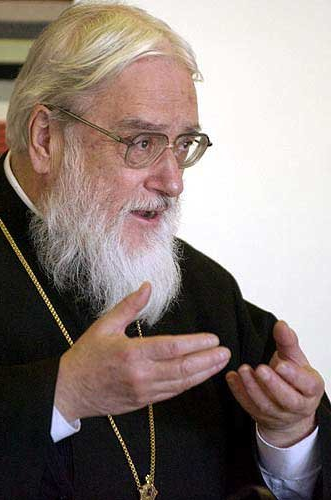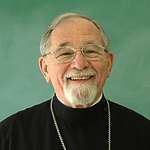FROM THE SERMON FOR JULY 10, 2011
"The Parable of the Sower" Matthew 13:1-9, 18-23
What I hear that goes back to the Jesus of history is a parable, which he told to communicate his experience, his vision, his passion for one thing - the one thing he was always trying to share - the Kingdom (the Empire, the Domain, the Reign, the Reality, the Presence, the Dream) of God.
I hear, "The Kingdom of God is like this..."
"Like a sower sowing seeds indiscriminately. So much so that they are nearly all wasted on the shallow path, on rocky soil, in the thorns. And yet somehow the most amazing, unexpected thing happens. Somehow, some of the seeds find good soil and the harvest is even more extravagant than the sower himself."
In the time of Jesus, a seven fold crop was a good year. A ten fold crop was truly abundant. But this harvest is thirty fold, enough to feed a village for a year. And sixty fold, double that. And one hundred fold. That's retirement! If you had a hundred fold crop, you'd never have to farm again - ever!
How could such a thing ever happen?! Well, the Kingdom of God is like that. Who could guess? Who could even imagine such a thing as the Kingdom of God?
How could such a thing ever happen? It's a miracle.
In the darkest times, in the ordinary times, in the mundane, in the least expected moments, the Kingdom of God springs up all around us, and within us. That non-geographical place where heaven and earth, divine and human, come together and become one.
"The Kingdom of God is at hand." In fact it is "within you," says Jesus. How could such a thing ever happen? It's a miracle.
That's what I hear that goes back to the original context, to the Jesus of history himself.
But even more important is what we hear Jesus saying to us here and now. What do you get out of this parable? How is Jesus using this story to touch you, to speak to you, to transform your life?
I can tell you what I hear, and encourage you to share what you hear.
What I hear is, "Expect miracles!" And as I hear that, I realize I'm thinking about this church. "Expect miracles."
I'm thinking about how isolated and cut off we had become from our diocese, from our community, and even from our own fellow Episcopal churches.... But what I hear is "Expect miracles!" In the darkest times, in the most ordinary times, in the mundane, in the least expected moments and ways, expect miracles.
So then I think of the priest who I had a breakfast meeting with recently who said, "Frankly, I'm surprised. I didn't think this church was going to make it, but you guys had the highest percent of your congregation that supported Episcopal night at the baseball game this year. I'm impressed!"
And I think of a woman in California who is receiving a prayer shawl from this church from a person in this community who's not even a member of this church but who received the healing gift of a prayer shawl himself and is passing on the gift of a prayer shawl to his sister.
I think of a boy's baseball team that's in Houston, Texas, today at their world series playoffs, whose coach's wife texted me from Houston yesterday, "We're doing great. Thank you for your prayers!" And I think of the picnic we're planning in the park on the 23rd to celebrate the hard work of "our boys" and to get to know their families.
I think of all the members of this church who showed up yesterday at Cliff Maus Village working shoulder to shoulder with Episcopalians from across Corpus Christi, and interacting with some of the residents with whom we hope to develop relationships in the future. When's the last time you can remember our church getting involved like that with other churches in making God's dream for this world come true?
I think of the plans for the blessing of backpacks coming up on August 20, which we're hosting for the neighborhood so that we can begin to establish ourselves as a caring presence in the community. And I think of the father of one of the baseball boys in the park whose eyes lit up when he heard that we were going to collect backpacks for some of the kids at Cliff Maus Village and include them in the "blessing of the backpacks", and who said, "Oh I want to donate some backpacks for that!"
I think of the beach cleanup we have scheduled for August 27th to show our care and appreciation of God's world, and how that's expanded to eight churches because we have also initiated a memorial event with these eight other churches (including Muslim and Jewish congregations) for the tenth anniversary of 9/11.
And I think of the men who stood in line for a pair of clean socks the last time John McDermont and his wife went out by themselves to distribute clothes to the homeless, and they ran out. "I'm so sorry", John said, "but next month I'll be back with my church, and we'll have ten times as much!" And that's where many of our members are right now - distributing clothes to the homeless.
"Expect miracles!" How else do you explain what's going on with this church? Still struggling to pay our own light bill, and yet the Kingdom of God is springing up all around us, and within us. The Dream of God is coming true for us, and through us... "The Kingdom of God is like this." "Expect miracles!"
That's what I hear. Can you hear that? Do you hear anything else? Anything different? Anything more? What else do you think Jesus might be trying to say to you? Keep listening, and keep sharing. The more we listen together, the better we hear.













